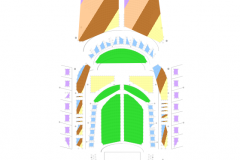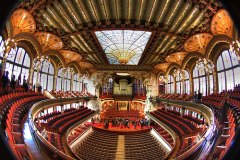Carmen
Mo | Tu | We | Th | Fr | Sa | Su |
Carmen, by G. Bizet
Synopsis
Place: Seville, Spain, and surrounding hills
Time: Around 1820
Act 1
A square, in Seville. On the right, a door to the tobacco factory. At the back, a bridge. On the left, a guardhouse.
A group of soldiers relaxes in the square, waiting for the changing of the guard and commenting on the passers-by ("Sur la place, chacun passe"). Micaëla appears, seeking José. Moralès tells her that "José is not yet on duty" and invites her to wait with them. She declines, saying she will return later. José arrives with the new guard, which is greeted and imitated by a crowd of urchins ("Avec la garde montante").
As the factory bell rings, the cigarette girls emerge and exchange banter with young men in the crowd ("La cloche a sonné"). Carmen enters and sings her provocative habanera on the untameable nature of love ("L'amour est un oiseau rebelle"). The men plead with her to choose a lover, and after some teasing she throws a flower to Don José, who thus far has been ignoring her but is now annoyed by her insolence.
As the women go back to the factory, Micaëla returns and gives José a letter and a kiss from his mother ("Parle-moi de ma mère!"). He reads that his mother wants him to return home and marry Micaëla, who retreats in shy embarrassment on learning this. Just as José declares that he is ready to heed his mother's wishes, the women stream from the factory in great agitation. Zuniga, the officer of the guard, learns that Carmen has attacked a woman with a knife. When challenged, Carmen answers with mocking defiance ("Tra la la... Coupe-moi, brûle-moi"); Zuniga orders José to tie her hands while he prepares the prison warrant. Left alone with José, Carmen beguiles him with a seguidilla, in which she sings of a night of dancing and passion with her lover—whoever that may be—in Lillas Pastia's tavern. Confused yet mesmerised, José agrees to free her hands; as she is led away she pushes her escort to the ground and runs off laughing. José is arrested for dereliction of duty.
Act 2
Lillas Pastia's Inn
A month has passed. Carmen and her friends Frasquita and Mercédès are entertaining Zuniga and other officers ("Les tringles des sistres tintaient") in Pastia's inn. Carmen is delighted to learn of José's release from a month's detention. Outside, a chorus and procession announces the arrival of the toreador Escamillo ("Vivat, vivat le Toréro"). Invited inside, he introduces himself with the "Toreador Song" ("Votre toast, je peux vous le rendre") and sets his sights on Carmen, who brushes him aside. Lillas Pastia hustles the crowds and the soldiers away.
When only Carmen, Frasquita and Mercédès remain, the smugglers Dancaïre and Remendado arrive and reveal their plans to dispose of some recently acquired contraband ("Nous avons en tête une affaire"). Frasquita and Mercédès are keen to help them, but Carmen refuses, since she wishes to wait for José. After the smugglers leave, José arrives. Carmen treats him to a private exotic dance ("Je vais danser en votre honneur ... La la la"), but her song is joined by a distant bugle call from the barracks. When José says he must return to duty, she mocks him, and he answers by showing her the flower that she threw to him in the square ("La fleur que tu m'avais jetée"). Unconvinced, Carmen demands he shows his love by leaving with her. José refuses to desert, but as he prepares to depart, Zuniga enters looking for Carmen. He and José fight, and are separated by the returning smugglers, who restrain Zuniga. Having attacked a superior officer, José now has no choice but to join Carmen and the smugglers ("Suis-nous à travers la campagne").
Act 3
A wild spot in the mountains
Carmen and José enter with the smugglers and their booty ("Écoute, écoute, compagnons"); Carmen has now become bored with José and tells him scornfully that he should go back to his mother. Frasquita and Mercédès amuse themselves by reading their fortunes from the cards; Carmen joins them and finds that the cards are foretelling her death, and José's. The women depart to suborn the customs officers who are watching the locality. José is placed on guard duty.
Micaëla enters with a guide, seeking José and determined to rescue him from Carmen ("Je dis que rien ne m'épouvante"). On hearing a gunshot she hides in fear; it is José, who has fired at an intruder who proves to be Escamillo. José's pleasure at meeting the bullfighter turns to anger when Escamillo declares his infatuation with Carmen. The pair fight ("Je suis Escamillo, toréro de Grenade"), but are interrupted by the returning smugglers and girls ("Holà, holà José"). As Escamillo leaves he invites everyone to his next bullfight in Seville. Micaëla is discovered; at first, José will not leave with her despite Carmen's mockery, but he agrees to go when told that his mother is dying. As he departs, vowing he will return, Escamillo is heard in the distance, singing the toreador's song.
Act 4
A square in Seville. At the back, the walls of an ancient amphitheatre
Zuniga, Frasquita and Mercédès are among the crowd awaiting the arrival of the bullfighters ("Les voici ! Voici la quadrille!"). Escamillo enters with Carmen, and they express their mutual love ("Si tu m'aimes, Carmen"). As Escamillo goes into the arena, Frasquita warns Carmen that José is nearby, but Carmen is unafraid and willing to speak to him. Alone, she is confronted by the desperate José ("C'est toi ! C'est moi !"). While he pleads vainly for her to return to him, cheers are heard from the arena. As José makes his last entreaty, Carmen contemptuously throws down the ring he gave her and attempts to enter the arena. He then stabs her, and as Escamillo is acclaimed by the crowds, Carmen dies. José kneels and sings "Ah! Carmen! ma Carmen adorée!"; as the crowd exits the arena, José confesses to killing the woman he loved.
Program and cast
27 September 2025 & 27 February 2026
Carmen by Georges Bizet
Josep Miquel Mindàn - Jaume Villanueva
Opera with Catalan subtitles.
Duration: approx. 150 minutes, including an interval
Our Carmen is the chronicle of a homicide, the violent murder of a woman.
Taken straight from the imaginary of Luís Buñuel, the mise-en-scène is nourished by the sour sherry of the tablaos in Las Ramblas and the fragrance of oranges and seawater that has that bitter aftertaste of the absinthe in Barcelona’s brothels, where the port has ben consolidated as the place for smuggling and slavery from an even more intense secular misery during General Franco’s dictatorship.
Performers
Josep Miquel Mindàn, conductor
Jaume Villanueva, staging
Miquel Villalba, director del coro
Orquestra de cambra Terrassa 48
Quim Térmens, concertino
Kevin Donaire, coreography inspired by the flamenco universes of Eli Ayala and Nacho Blanco
Òpera Popular de Barcelona, stable company:
Nataliia Matvieieva, Carmen
Arturo Garralón, Don José
Joan García Gomà, Escamillo
Mireia Dolç, Micaela
Danil Sayfullin, Zúñiga
Alba Martínez, Frasquita
Maria Batlle, Mercedes
Elias Torricelli, Remendado
Alejandro Chelet, Dancaire/Morales
Choir and ballet of the Popular Opera of Barcelona
With the collaboration of the students of the Professional Dance Conservatory of the Institut del Teatre of the Diputació de Barcelona
Program
G. Bizet: Carmen
21 March 2026
Carmen, by G. Bizet
Staged opera in two acts
Opera subtitled in Catalan, Spanish, English and in the original language.
Duration: approx. 165 minutes, including an interval
GEORGES BIZET's Carmen is one of the most acclaimed and daily performed operas internationally. Few operas in the great repertoire reach and excite the public like this one. His original music, penetrating and seductive, is a combination of different styles ranging from the most classic French romanticism to the most beautiful melodies inspired by Spanish folklore.
Staged version of two hours and a quarter with 15 minutes of intermission. Symphony orchestra, solo singers, heart, Spanish dance troupe, costumes, unique and brilliant lighting appropriate to the special characteristics of the Palau de la Música Catalana… More than 60 artists on stage.
Performers
Orquestra NovAria Filharmonia
Cor NovAria / Ballet NovAria
Adolf Gassol, conductor
Marta Finestres, choir conductor
Sergi Giménez, artistic direction
Sarah Zhai, vocal coach
CAST
Cristina Segura, Sophie Burns, Kristen Larsen, Carmen
Vicenç Esteve, Andrés Sánchez, Don José
Alberto Cazes, Antonio Torres, Escamillo
Katerina Estrada Tretyakova, Sarah Zhai, Maylin Cruz, Jen Qian, Micaela
Juhee Nam, Mònica Grau, Frasquita
Olha Shvydka, Anastasia Apreutesii, Anna Guasch, Mercedes
Rodrigo Aguilar, Victor Alonso, Dancairo
Jose Cabrero, Jordi Casanova, Remendado
Lluís Vergés, Rodrigo Aguilar, Zúñiga
Program
G. BIZET: Carmen
The Palau de la Música Catalana
The Palau de la Música Catalana is one of the most representative monuments of Art Nouveau architecture.
An emblematic building of the Catalan Modernism, declared a World Heritage Site by UNESCO in 1997.
Built between 1905 and 1908 by the great architect Lluis Domènech i Montaner, the Palau de la Música Catalana is an architectural jewel of Barcelona and essential part of any visit to the city, as any of the most fascinating Gaudi buildings.
We suggest you visit the Palau with experienced guides, to discover and The Palau de la Música Catalana is one of the most representative monuments of Art Nouveau architecture.
An emblematic building of the Catalan Modernism, declared a World Heritage Site by UNESCO in 1997.
Built between 1905 and 1908 by the great architect Lluis Domènech i Montaner, the Palau de la Música Catalana is an architectural jewel of Barcelona and essential part of any visit to the city, as any of the most fascinating Gaudi buildings.
We suggest you visit the Palau with experienced guides, to discoverand experience its wonders: a whole world of surprises and refined details of Art Nouveau architecture.
Allow us to guide you round it and to show you and explain in a fun, enriching way its history, art and other curiosities that you can discover by joining us.

 EN
EN DE
DE IT
IT FR
FR ES
ES RU
RU JP
JP RO
RO
 Seating plan
Seating plan 